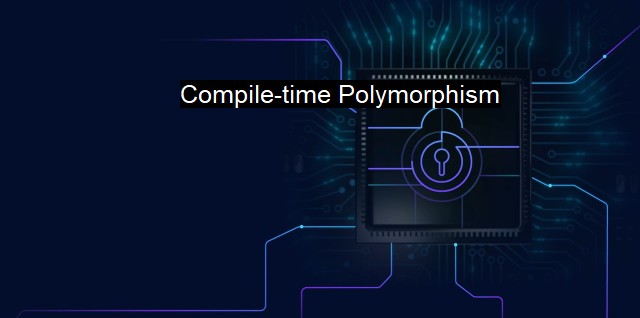What is Compile-time Polymorphism?
Leveraging Compile-Time Polymorphism: A Powerful Approach for Cybersecurity and Antivirus Development
Compile-time polymorphism is a concept used in object-oriented programming (OOP) that advocates writing functions or variables of the same name differently in different programmatic contexts. The mechanism achieves polymorphism through function overloading and operator overloading, which entails its execution during program compilation, hence the term "compile-time." Familiarizing ourselves with polymorphism principles helps sharpen our understanding of cybersecurity, specifically in the context of antivirus development.Compile-time polymorphism allows a single functionality to be utilized in multiple ways. Notably, function overloading happens when multiple functions with the same name exist in the class but have different arguments, providing unique means to control function access. On the other hand, operator overloading allows programmers to redefine an operator's functionality.
Because compile-time polymorphism happens during compilation, early resolution, also known as static binding or early binding, distinguishes its resolution type. Much before everything unravels during runtime, the compile-time procedure accomplishes method overloading and operator overloading to specify the real code to gain traction.
Preceding the detailed execution of a program, the chances are that without polymorphism, the standard security protocols are that the drill for each operation had to be set manually. Trends have now entirely evolved. Through compile-time polymorphism, security algorithms can opt for function overriding or operator overloading, assign diverse arguments, provide varying degrees of access control, and ultimately strengthen a program's safeguards with unique encryption for each function.
In the antivirus spectrum, compile-time polymorphism is vital in combating polymorphic viruses, which are malware that modify their code every time they propagate. Antiviruses use polymorphism to stay ahead of polymorphic viruses. Intricacies arise in detecting and quashing these types of viruses, given their unique potential to alter their signature by scrambling or partitioning themselves when cloning.
Combating this is a two-fold operation for antiviruses using compile-time polymorphism, entailing detection and disinfection. Detection involves matching signatures (known virus self-replication patterns) with a database of virus signatures. with polymorphic viruses continuously altering their code, matching this proves bothersome. Antiviruses, therefore, employ heuristic analysis that detects suspicious trends earmarked as potential threats, thereby recognizing the creative of polymorphic strains.
Compile-time polymorphism further morphs disinfection from a standard to a prudent, dynamic operation. The antivirus uses polymorphism principles to architect personalized solutions that trunk the virus's propagation, neutralize its toxicity, and rid the malware out the system safely.
Compile-time polymorphism becomes instrumental in the contemporary need for layered security strategies that present bulwarks across multiple channels against sophisticated threats. With varying degrees of access operation and multi-layered security commissions, polymorphism proves critical to conceiving different responses for different attacks, strengthening it against known and potential threat vectors.
The role of compile-time polymorphism within cybersecurity and antivirus design and execution can't be understated. By redefining various overwrite functions while optimizing security across integrated channels, compile-time polymorphism adds to making security more robust and dynamic. Its role in developing advanced security networks allows programmers to jot down evolved challenges while simultaneously offering an adaptable return. The continuation of advancements in quest of better sanitation methods will only enhance polymorphism's overall significance in programming strong, resistant network ecosystems.

Compile-time Polymorphism FAQs
What is compile-time polymorphism in cybersecurity and antivirus?
Compile-time polymorphism is a programming concept that allows code to be written in a way that allows the compiler to determine the appropriate implementation of a function or object at compile-time, rather than at run-time. In cybersecurity and antivirus, this concept can be applied to create more secure and efficient code that is optimized for specific security tasks.How does compile-time polymorphism help in creating secure antivirus software?
Compile-time polymorphism helps in creating secure antivirus software by allowing developers to write code that is optimized for specific security tasks, such as malware detection and removal. This ensures that the antivirus software is capable of detecting and removing malware in the most efficient and secure manner possible, helping to protect the user's system from potential security threats.What are the advantages of using compile-time polymorphism in cybersecurity software development?
The advantages of using compile-time polymorphism in cybersecurity software development include improved security, increased efficiency, and reduced code complexity. By optimizing code at compile-time, developers can create software that is tailored to specific security tasks, resulting in better overall performance and a reduced risk of security breaches. Additionally, the reduction in code complexity can make the software easier to maintain and update over time.How is compile-time polymorphism different from runtime polymorphism in cybersecurity and antivirus?
Compile-time polymorphism and runtime polymorphism are two different programming concepts that are used in cybersecurity and antivirus software development. Compile-time polymorphism allows the compiler to determine the appropriate implementation of a function or object at compile-time, while runtime polymorphism allows the appropriate implementation to be determined at runtime, based on the type of object being processed. While both concepts can be used effectively in cybersecurity and antivirus software development, compile-time polymorphism is generally considered to be more efficient and secure, as it allows the compiler to optimize the code for specific security tasks before it is executed.| | A | | | B | | | C | | | D | | | E | | | F | | | G | | | H | | | I | | | J | | | K | | | L | | | M | |
| | N | | | O | | | P | | | Q | | | R | | | S | | | T | | | U | | | V | | | W | | | X | | | Y | | | Z | |
| | 1 | | | 2 | | | 3 | | | 4 | | | 7 | | | 8 | | |||||||